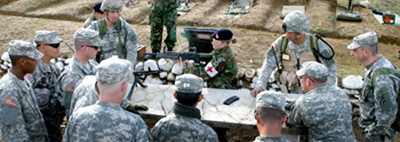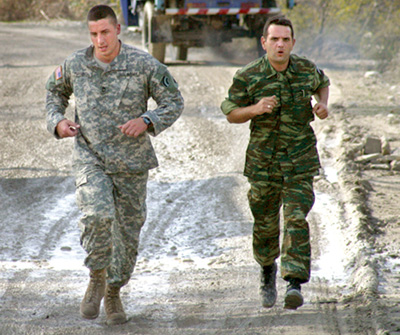 |
 |
Sgt. Hayley Allen of the British Army explains the SA-80 rifle operations to 2nd Battalion, 113th Infantry Soldiers. |
ZALL HERR, Albania - Hello. Pershendetje. Yia Su. Salute. These are just a few greetings heard in English, Albanian, Greek and Moldovan by Soldiers of C Company, 2-113th Infantry Battalion during the “Cooperative Lancer 07 Exercise” (COLR 07) conducted in Albania Oct.19 - 30.
According to Lt. Col. Bardhyl Kollcaku, Commander, 2nd Battalion, Rapid Reaction Brigade, Albanian Army COLR 07 has various objectives. These objectives include bringing together NATO, Mediterranean Dialogue, and Partnership for Peace members, increasing interoperability and conducting crisis response operations. He added that this exercise will serve also as a framework for the 1st Albanian Coy (Company) to be evaluated to further Albania’s goal of becoming a future NATO member.
Nearly 1,000 soldiers from 21 countries were formed into a multinational battalion as the primary training audience for COLR 07. The multinational battalion was headed by Lt. Col. Kollcaku and the senior noncommissioned officer of the multinational battalion was New Jersey’s own Command Sgt. Maj. Thomas Clark of the 2-113th Infantry Battalion, which is one of six battalions in the 50th Infantry Brigade Combat Team. Other leadership positions were drawn from the various other units. This exercise further built upon the relationships forged during the Unit Level Exchange between the 2nd Battalion, Rapid Reaction Brigade (RRB), Albanian Army and A Company, 2-113th Infantry in July and August.
The exercise was divided into three stages of three days each and a challenge day. Stage one consisted of individual tasks to include Improvised Explosive Device training, the media, mines, first aid, rules of engagement, communications, anti-terrorism, observation post operations and live fire of weapons such as the AK-47 and SA-80. “We learned that all weapons are pretty much the same,” said Sgt. James Bedrossian, 2-113th Infantry.
Stage two consisted of squad-level tasks and was broken down into three different areas: Area Operations, Convoy Operations, and Urban Operations. Beyond participating in these tasks, eight Soldiers from the 2-113th also expertly instructed the other multinational service members in Urban Operations and Area Operations. Stage two was the bridge to stage three collective tasks.
The Challenge Day provided a nice change of pace between stages two and three. It consisted of three scored events - running, firing and grenade throwing, and was a chance for “friendship through sport,” according to Kollcaku.
Stage three consisted of Coy-level operations during a Field Training Exercise. Each of the three Coy then did conduct Area Operations, Convoy Operations, and Urban Operation at the Coy level. The final part of the field training exercise culminated with a one-day cordon and search mission Oct. 29. This is where all battalion staff and all assets to include medical troops did conduct cordon and search operations, according to Kollcaku. In this stage, the 2-113th provided evaluators in addition to the already emplaced battalion staff and medical team.
| With such a diverse group of service members with cultural and language differences, it is inevitable that there will be some challenges in an exercise such as this. “The training is harder than I thought due to the language,” said Staff Sgt. Edwin Cruz, 2-113th Infantry. Even with the language barrier, it was largely overcome with the use of interpreters, native language documents, display items and body language. Another challenge was the military cultural difference. “The NCO in all countries does not play the same role; in some they have greater importance, in some lesser importance,” noted Clark. This challenge was met through mentoring of countries whose NCO Corps took a lesser role by those nations with stronger NCO Corps. |  |
The benefits from this multinational exercise were multiple and broad. “The foreign relations that are materializing; it has opened my eyes to a whole new way a military can function,” said Spc. Scott W. Kowalski, 2-113th Infantry. International service members also feel positively about the benefits of this exercise. “If you want to help all the world, it is important to contact (those from other nations),” explained Master Sgt. Petros Tsintsaris of the 507th Mechanized Infantry Battalion, Greek Army. Insight into the value of the training here toward a future deployment was definitely in the minds of many participants. “These are the people we are going to work with in the future. You know the training he has because you see it here,” stated Pfc. Lamar Reddick, 2-113th Infantry. 1st Lt. Ervis Tusha, commander of Lion Heart Company, 2nd Battalion, RRB, summarized the benefits of the exercise quite simply, “Exchange of experience; to know the culture of each other…friendship.”
The COLR 07 exercise proved to be a rare opportunity and mutually beneficial for the New Jersey Army National Guard, our accommodating Albanian hosts, and all nations involved. As the exercise closed, what might have been the voice heard in various languages? Good job. Pune te mbare (Albanian). Kali-thuya (Greek). Au avut succes (Moldovan).
 |
Volume 33 Number 5 Staff / Information | |
 |